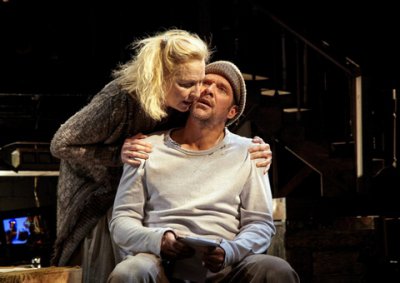Tennessee Williams 1982
Unfamiliar and unusual one-acts from the last year of the playwright’s life: a cynical fable and a Grand Guignol example of Theater of Cruelty.

Kate Skinner and Ford Austin in a scene from Tennessee Williams’ “A Recluse and His Guest” (Photo credit: Antonis Achilleos)
[avatar user=”Victor Gluck” size=”96″ align=”left” ] Victor Gluck, Editor-in-Chief[/avatar]From 1966 on, the date of the Broadway production of Slapstick Tragedy which included “The Mutilated” and “Gnadiges Fraulein,” Tennessee Williams’ plays became increasingly experimental, and pleased the critic less. After his death, 70 unpublished one-acts were discovered among his papers and have begun to appear in three volumes so far.
Under the umbrella title Tennessee Williams 1982 (the year of both play’s composition as well as that of the playwright’s death), The Playhouse Creatures Theatre Company is presenting the world premiere of “A Recluse and His Guest” (to be published this summer) and the New York premiere of “The Remarkable Rooming-House of Mme. Le Monde,” (included in the 2008 volume, The Traveling Companion and Other Plays.) Not only are these unfamiliar plays uncharacteristic of the writer’s other work (a fable and a Grand Guignol), they have been given a surrealistic production by director Cosmin Chivu who directed the 2013 provocative revival of The Mutilated which demonstrated the viability of that black comedy once consigned to the scrap heap. Both plays in this doublebill are unified by their cynicism and their dark view of the world. While the plays may not be to everyone’s taste, the doublecasting of the two plays demonstrates remarkable versatility on the part of the talented cast, which is at times uneven.
The fairy tale atmosphere of “A Recluse and His Guest” is established by its setting: “a far northern town in a remote time.” A woman later revealed to be Nevrika who “knows the language of the birds,” obviously on the run, arrives in the inhospitable town of Staad, dressed in leather hides and hiding her sex and her identity, in the dead of winter. Homeless and penniless, she steals a loaf of bread, and asks a sanctimonious Citizen for the address of “a man not married that would have use for a woman for a while.” Once at the home of the stingy, reclusive, damaged Ott who lives in a house with the windows boarded up, she ingratiates herself to the lonely hermit and becomes his housekeeper and companion. Aside from convincing him to open the windows, she gets him to finally venture out to the Spring Festival. However, after an unforeseen incident, he reverts to his old ways, becoming suspicious once more, and her tenure in his house seems about to come to an end. However, Nevrika is a woman who believes that “it is life to go on even when it is death to.”
As the indomitable Nevrika, Kate Skinner put us in mind of Brecht’s Mother Courage able to cope with any adversity. Ford Austin’s stolid Ott remains remote without delineating the gradations of change in his circumstances. The rest of the cast (Jade Ziane as The Baker, Beau Allen as a hypocritical Citizen and later the Town Councilor, Declan Eells as The Tavern Keeper, and Anne Wechsler as A Customer and finally the Golden-Haired Girl) help populate this far away community of the north.

Kate Skinner and Patrick Darwin Williams in a scene from Tennessee Williams’ “The Remarkable Rooming-House of Mme. Le Monde” (Photo credit: Antonis Achilleos)
“The Remarkable Rooming-House of Mme. Le Monde” which had its world premiere at the Provincetown Tennessee Williams Theater Festival in 2009 creates a chamber of horror which suggests an Americanized version of Joe Orton, Jean Genet or Eugene Ionesco. The penniless Mint (who has become mysteriously paralyzed when his allowance stopped) lives in the attic of Mme. Le Monde’s London house only able to move about by hooks hanging from the ceiling or crawling on the floor. Openly gay, he is continually assaulted by his landlady’s lustful and lascivious son.
Having invited Hall, a former public school classmate at Scotum-on-Swansea, to tea, Mint watches as his guest devours what Mme. Le Monde has said will be his last meal. Hall (either a stockbroker or a con-artist), it appears, has come for this visit basically to see the landlady and has little regard for Mint’s predicament. After the shocking ending, Mme. Le Monde (who has acted as a kind of kinky mistress of ceremonies) announces the moral: “The world is accident prone, no use attempting correction. After all, the loss of one fool makes room for another.”
As directed by Chivu, the tone of this play is bizarre and grotesque, a sort of mad tea party turned murderous. The three returning actors give performances so different from the first play as to be unrecognizable. Ziane plays the sorely harried Mint, making this role as physical as it is emotional. Eells reveals enormous glee as the lusty, sociopathic Son. Skinner’s Mme. Le Monde, unrecognizable in a red fright wig, is wholeheartedly blowzy and laid-back. As a woman who gets what she wants but also knows her powers, she has certain character traits in common with the wily Nevrika in the earlier play. Only Patrick Darwin Williams as Hall has trouble finding his character’s center, making him more of a Joe Orton villain than that of Williams. The English accents vary wildly but in the actors’ defense, they are all intended to be from different walks of life.
The unusual setting by Justin West serves for both plays, reminiscent of both a derelict attic or an old antique store, and creates both outdoor and indoor playing areas. The costumes by Angela Wendt offer a realistic depiction of the first play (warm winter wear for the cold climate) and a circus atmosphere for the second (Hall dressed in a shocking pink suit with a purple shirt, etc.) The special effects which make use of various television monitors around the stage (like the roaring fire) are distracting, but it is not clear whether this is part of West’s setting or John Eckert’s lighting design. The most success production element is the live, original music written and performed by Paul Brantley which adds to the otherworldly tone of both plays.
Tennessee Williams 1982 is a fascinating attempt to put some of the playwright’s late experimental work on stage in an appropriate form. While neither play is for all theatergoers particular those who only know the author from his major full-lengths, the evening demonstrates that Williams was still trying at the end of life to work towards a new style of drama. Cosmin Chivu’s production is not always successful, but it gives Kate Skinner a tour de force in two remarkable contrasting roles in which she reveals tremendous range.
Tennessee Williams 1982 (through March 13, 2016)
Playhouse Creature Theatre Company
Walkerspace, 46 Walker Street, between Broadway and Church Street, in Manhattan
For tickets, call 800-838-3006 or visit http://www.playhousecreatures.org
Running time: one hour and 40 minutes including one intermission






Leave a comment